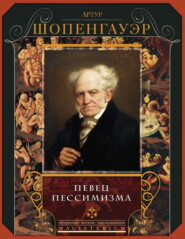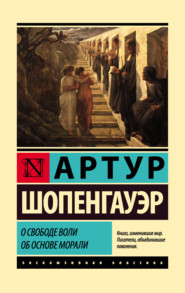По всем вопросам обращайтесь на: info@litportal.ru
(©) 2003-2024.
✖
The Essays of Arthur Schopenhauer; the Art of Controversy
Настройки чтения
Размер шрифта
Высота строк
Поля
The Homonymy. – This trick is to extend a proposition to something which has little or nothing in common with the matter in question but the similarity of the word; then to refute it triumphantly, and so claim credit for having refuted the original statement.
It may be noted here that synonyms are two words for the same conception; homonyms, two conceptions which are covered by the same word. (See Aristotle, Topica, bk. i., c. 13.) "Deep," "cutting," "high," used at one moment of bodies at another of tones, are homonyms; "honourable" and "honest" are synonyms.
This is a trick which may be regarded as identical with the sophism ex homonymia; although, if the sophism is obvious, it will deceive no one.
Every light can be extinguished.
The intellect is a light.
Therefore it can be extinguished.
Here it is at once clear that there are four terms in the syllogism, "light" being used both in a real and in a metaphorical sense. But if the sophism takes a subtle form, it is, of course, apt to mislead, especially where the conceptions which are covered by the same word are related, and inclined to be interchangeable. It is never subtle enough to deceive, if it is used intentionally; and therefore cases of it must be collected from actual and individual experience.
It would be a very good thing if every trick could receive some short and obviously appropriate name, so that when a man used this or that particular trick, he could be at once reproached for it.
I will give two examples of the homonymy.
Example 1. – A.: "You are not yet initiated into the mysteries of the
Kantian philosophy."
B.: "Oh, if it's mysteries you're talking of, I'll have nothing to do with them."
Example 2. – I condemned the principle involved in the word honour as a foolish one; for, according to it, a man loses his honour by receiving an insult, which he cannot wipe out unless he replies with a still greater insult, or by shedding his adversary's blood or his own. I contended that a man's true honour cannot be outraged by what he suffers, but only and alone by what he does; for there is no saying what may befall any one of us. My opponent immediately attacked the reason I had given, and triumphantly proved to me that when a tradesman was falsely accused of misrepresentation, dishonesty, or neglect in his business, it was an attack upon his honour, which in this case was outraged solely by what he suffered, and that he could only retrieve it by punishing his aggressor and making him retract.
Here, by a homonymy, he was foisting civic honour, which is otherwise called good name, and which may be outraged by libel and slander, on to the conception of knightly honour, also called point d'honneur, which may be outraged by insult. And since an attack on the former cannot be disregarded, but must be repelled by public disproof, so, with the same justification, an attack on the latter must not be disregarded either, but it must be defeated by still greater insult and a duel. Here we have a confusion of two essentially different things through the homonymy in the word honour, and a consequent alteration of the point in dispute.
III
Another trick is to take a proposition which is laid down relatively, and in reference to some particular matter, as though it were uttered with a general or absolute application; or, at least, to take it in some quite different sense, and then refute it. Aristotle's example is as follows:
A Moor is black; but in regard to his teeth he is white; therefore, he is black and not black at the same moment. This is an obvious sophism, which will deceive no one. Let us contrast it with one drawn from actual experience.
In talking of philosophy, I admitted that my system upheld the Quietists, and commended them. Shortly afterwards the conversation turned upon Hegel, and I maintained that his writings were mostly nonsense; or, at any rate, that there were many passages in them where the author wrote the words, and it was left to the reader to find a meaning for them. My opponent did not attempt to refute this assertion ad rem, but contented himself by advancing the argumentum ad hominem, and telling me that I had just been praising the Quietists, and that they had written a good deal of nonsense too.
This I admitted; but, by way of correcting him, I said that I had praised the Quietists, not as philosophers and writers, that is to say, for their achievements in the sphere of theory, but only as men, and for their conduct in mere matters of practice; and that in Hegel's case we were talking of theories. In this way I parried the attack.
The first three tricks are of a kindred character. They have this in common, that something different is attacked from that which was asserted. It would therefore be an ignoratio elenchi to allow oneself to be disposed of in such a manner.
For in all the examples that I have given, what the opponent says is true, but it stands in apparent and not in real contradiction with the thesis. All that the man whom he is attacking has to do is to deny the validity of his syllogism; to deny, namely, the conclusion which he draws, that because his proposition is true, ours is false. In this way his refutation is itself directly refuted by a denial of his conclusion, per negationem consequentiae. Another trick is to refuse to admit true premisses because of a foreseen conclusion. There are two ways of defeating it, incorporated in the next two sections.
IV
If you want to draw a conclusion, you must not let it be foreseen, but you must get the premisses admitted one by one, unobserved, mingling them here and there in your talk; otherwise, your opponent will attempt all sorts of chicanery. Or, if it is doubtful whether your opponent will admit them, you must advance the premisses of these premisses; that is to say, you must draw up pro-syllogisms, and get the premisses of several of them admitted in no definite order. In this way you conceal your game until you have obtained all the admissions that are necessary, and so reach your goal by making a circuit. These rules are given by Aristotle in his Topica, bk. viii., c. 1. It is a trick which needs no illustration.
V
To prove the truth of a proposition, you may also employ previous propositions that are not true, should your opponent refuse to admit the true ones, either because he fails to perceive their truth, or because he sees that the thesis immediately follows from them. In that case the plan is to take propositions which are false in themselves but true for your opponent, and argue from the way in which he thinks, that is to say, ex concessis. For a true conclusion may follow from false premisses, but not vice versâ. In the same fashion your opponent's false propositions may be refuted by other false propositions, which he, however, takes to be true; for it is with him that you have to do, and you must use the thoughts that he uses. For instance, if he is a member of some sect to which you do not belong, you may employ the declared, opinions of this sect against him, as principles.[11 - Aristotle, Topica bk. viii., chap. 2.]
VI
Another plan is to beg the question in disguise by postulating what has to be proved, either (1) under another name; for instance, "good repute" instead of "honour"; "virtue" instead of "virginity," etc.; or by using such convertible terms as "red-blooded animals" and "vertebrates"; or (2) by making a general assumption covering the particular point in dispute; for instance, maintaining the uncertainty of medicine by postulating the uncertainty of all human knowledge. (3) If, vice versâ, two things follow one from the other, and one is to be proved, you may postulate the other. (4) If a general proposition is to be proved, you may get your opponent to admit every one of the particulars. This is the converse of the second.[12 - Idem, chap. 11. The last chapter of this work contains some good rules for the practice of Dialectics.]
VII
Should the disputation be conducted on somewhat strict and formal lines, and there be a desire to arrive at a very clear understanding, he who states the proposition and wants to prove it may proceed against his opponent by question, in order to show the truth of the statement from his admissions. The erotematic, or Socratic, method was especially in use among the ancients; and this and some of the tricks following later on are akin to it.[13 - They are all a free version of chap. 15 of Aristotle's De Sophistici Elenchis.]
The plan is to ask a great many wide-reaching questions at once, so as to hide what you want to get admitted, and, on the other hand, quickly propound the argument resulting from the admissions; for those who are slow of understanding cannot follow accurately, and do not notice any mistakes or gaps there may be in the demonstration.
VIII
This trick consists in making your opponent angry; for when he is angry he is incapable of judging aright, and perceiving where his advantage lies. You can make him angry by doing him repeated injustice, or practising some kind of chicanery, and being generally insolent.
IX
Or you may put questions in an order different from that which the conclusion to be drawn from them requires, and transpose them, so as not to let him know at what you are aiming. He can then take no precautions. You may also use his answers for different or even opposite conclusions, according to their character. This is akin to the trick of masking your procedure.
X
If you observe that your opponent designedly returns a negative answer to the questions which, for the sake of your proposition, you want him to answer in the affirmative, you must ask the converse of the proposition, as though it were that which you were anxious to see affirmed; or, at any rate, you may give him his choice of both, so that he may not perceive which of them you are asking him to affirm.
XL
If you make an induction, and your opponent grants you the particular cases by which it is to be supported, you must refrain from asking him if he also admits the general truth which issues from the particulars, but introduce it afterwards as a settled and admitted fact; for, in the meanwhile, he will himself come to believe that he has admitted it, and the same impression will be received by the audience, because they will remember the many questions as to the particulars, and suppose that they must, of course, have attained their end.
XII
If the conversation turns upon some general conception which has no particular name, but requires some figurative or metaphorical designation, you must begin by choosing a metaphor that is favourable to your proposition. For instance, the names used to denote the two political parties in Spain, Serviles and Liberates, are obviously chosen by the latter. The name Protestants is chosen by themselves, and also the name Evangelicals; but the Catholics call them heretics. Similarly, in regard to the names of things which admit of a more exact and definite meaning: for example, if your opponent proposes an alteration, you can call it an innovation, as this is an invidious word. If you yourself make the proposal, it will be the converse. In the first case, you can call the antagonistic principle "the existing order," in the second, "antiquated prejudice." What an impartial man with no further purpose to serve would call "public worship" or a "system of religion," is described by an adherent as "piety," "godliness": and by an opponent as "bigotry," "superstition." This is, at bottom, a subtle petitio principii. What is sought to be proved is, first of all, inserted in the definition, whence it is then taken by mere analysis. What one man calls "placing in safe custody," another calls "throwing into prison." A speaker often betrays his purpose beforehand by the names which he gives to things. One man talks of "the clergy"; another, of "the priests."
Of all the tricks of controversy, this is the most frequent, and it is used instinctively. You hear of "religious zeal," or "fanaticism"; a "faux pas" a "piece of gallantry," or "adultery"; an "equivocal," or a "bawdy" story; "embarrassment," or "bankruptcy"; "through influence and connection," or by "bribery and nepotism"; "sincere gratitude," or "good pay."
XIII
To make your opponent accept a proposition, you must give him the counter-proposition as well, leaving him his choice of the two; and you must render the contrast as glaring as you can, so that to avoid being paradoxical he will accept the proposition, which is thus made to look quite probable. For instance, if you want to make him admit that a boy must do everything that his father tells him to do, ask him "whether in all things we must obey or disobey our parents." Or, if a thing is said to occur "often," ask whether by "often" you are to understand few or many cases; and he will say "many." It is as though you were to put grey next black, and call it white; or next white, and call it black.
XIV
This, which is an impudent trick, is played as follows: When your opponent has answered several of your questions without the answers turning out favourable to the conclusion at which you are aiming, advance the desired conclusion, – although it does not in the least follow, – as though it had been proved, and proclaim it in a tone of triumph. If your opponent is shy or stupid, and you yourself possess a great deal of impudence and a good voice, the trick may easily succeed. It is akin to the fallacy non causae ut causae.
XV
If you have advanced a paradoxical proposition and find a difficulty in proving it, you may submit for your opponent's acceptance or rejection some true proposition, the truth of which, however, is not quite palpable, as though you wished to draw your proof from it. Should he reject it because he suspects a trick, you can obtain your triumph by showing how absurd he is; should he accept it> you have got reason on your side for the moment, and must now look about you; or else you can employ the previous trick as well, and maintain that your paradox is proved by the proposition which he has accepted. For this an extreme degree of impudence is required; but experience shows cases of it, and there are people who practise it by instinct.
XVI
Another trick is to use arguments ad hominem, or ex concessis[14 - The truth from which I draw my proof may he either (1) of an objective and universally valid character; in that case my proof is veracious, secundum veritatem; and it is such proof alone that has any genuine validity. Or (2) it may be valid only for the person to whom I wish to prove my proposition, and with whom I am disputing. He has, that is to say, either taken up some position once for all as a prejudice, or hastily admitted it in the course of the dispute; and on this I ground my proof. In that case, it is a proof valid only for this particular man, ad kominem. I compel my opponent to grant my proposition, but I fail to establish it as a truth of universal validity. My proof avails for my opponent alone, but for no one else. For example, if my opponent is a devotee of Kant's, and I ground my proof on some utterance of that philosopher, it is a proof which in itself is only ad hominem. If he is a Mohammedan, I may prove my point by reference to a passage in the Koran, and that is sufficient for him; but here it is only a proof ad hominem,] When your opponent makes a proposition, you must try to see whether it is not in some way – if needs be, only apparently – inconsistent with some other proposition which he has made or admitted, or with the principles of a school or sect which he has commended and approved, or with the actions of those who support the sect, or else of those who give it only an apparent and spurious support, or with his own actions or want of action. For example, should he defend suicide, you may at once exclaim, "Why don't you hang yourself?" Should he maintain that Berlin is an unpleasant place to live in, you may say, "Why don't you leave by the first train?" Some such claptrap is always possible.
XVII

















